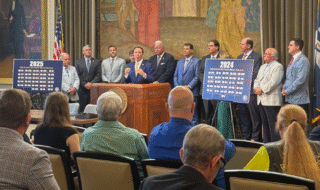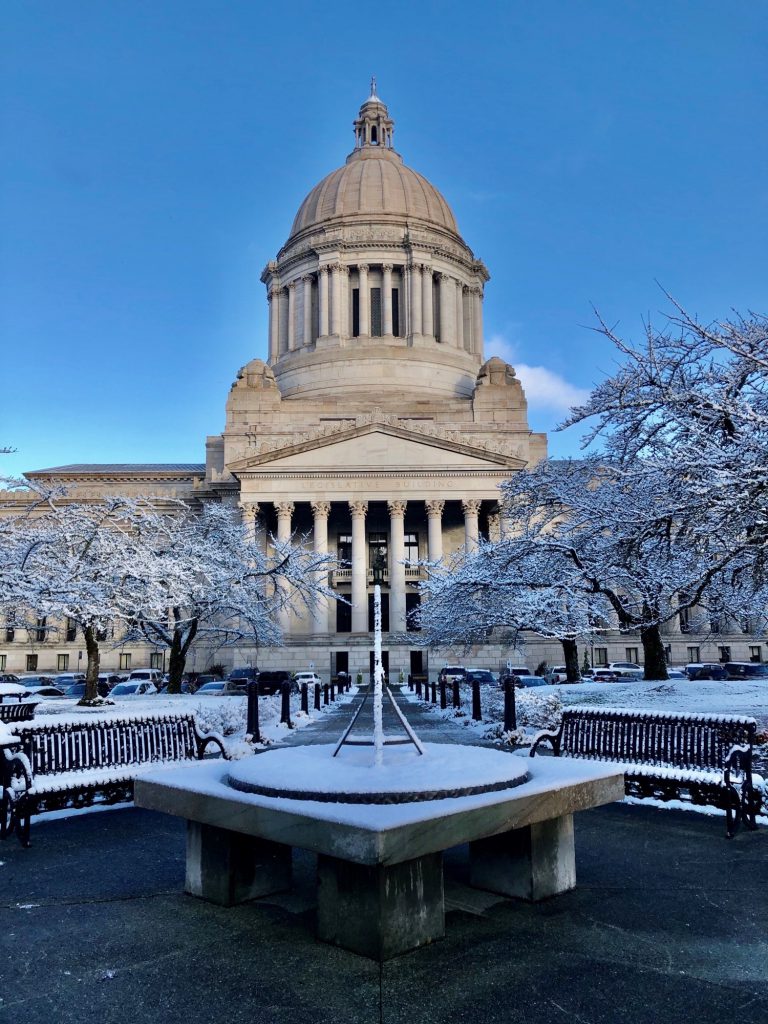March 12, 2021
NFIB Washington Legislative Update | Week 9
State Director Patrick Connor reports from Olympia on the small-business agenda for the legislative and political week ending March 12
Tuesday, March 9, at 5 p.m. marked the deadline for bills to pass from their chamber of origin. Having worked all the prior weekend, the state House was able to adjourn early, a feat not usually seen on a major cut-off day. In the more usual fashion, the state Senate brought up a bill earlier Tuesday afternoon, but delayed its final consideration until others had been voted upon, allowing the chamber to continue working on the deferred bill beyond 5 p.m.
As a result of this latest cut-off, the number of active bills NFIB is following has been reduced by nearly half from the start of session. When legislation where our position has changed to neutral, or where we are only monitoring in case of an unexpected change, is factored in, the number of active bills where we have an interest has dropped by three-fifths. However, several of the remaining 33 bills of concern that are still in play would have significant impact on our state’s small-business owners and their operations.
Small Business Day 2021
Thanks to our sponsor, Rock Point Oysters, NFIB will be hosting a virtual Small Business Day on March 24, from 11:45 a.m. to 1:15 p.m.
Guests include:
- Nick Streuli, External Affairs Executive Director, Office of Governor Jay Inslee
- Senate Republican Leader John Braun (NFIB member)
- House Finance Committee Chair Noel Frame
Additional sponsorship opportunities are available. Contact Senior Grassroots Manager Stacy Jenkins for details.
#OpenSafeOpenNow
Yesterday (Thursday, March 11), Governor Jay Inslee finally announced the state will move to Phase 3 reopening, effective March 22.
While details are few, the governor did indicate that gyms, restaurants, bars, theaters, and other entertainment venues will be allowed to increase indoor service to 50% capacity. Attendance restrictions will also be relaxed at certain high school and professional sporting events, although mask mandates and social distancing requirements will apply.
Moreover, future decisions about advancing or regressing in Phases will be county-based, with different metrics applying to large and small counties.
While this announcement is welcome news, Washington state continues to lag behind most of the rest of the country in relaxing its state of emergency and returning to some semblance of normalcy.
Environment
- HB 1091, the Low Carbon Fuel Standard (LCFS), was heard in the Senate Energy, Environment & Technology Committee Wednesday. It is scheduled for executive action (amendment and approval) on Tuesday, March 16. NFIB has issued an action alert on this legislation, which we strongly oppose. If you haven’t already contacted your state senator to express your objections to the bill, we urge you to do so very soon.
- SB 5126, Gov. Inslee’s cap-and-trade bill, is scheduled for a hearing and executive action in the Senate Ways & Means Committee next week. A competing carbon tax bill, SB 5373, which was heard in the Senate energy committee last week, has not been scheduled for executive action by that panel, so appears unlikely to advance. However, as a revenue bill, it is exempt from the normal cut-off calendar, so could reappear as part of the Senate’s budget proposal or a final budget agreement. NFIB opposes both bills.
Health Care
- SB 5149, the governor’s health-insurance tax increase proposal to fund foundational public health, did not advance to the Senate floor for a vote, but is also exempt from cut-off as a revenue bill. NFIB opposes the bill.
- SB 5399, establishing a commission to plan and implement a state-based universal health care system passed the Senate, and is scheduled for public hearing in the House Health Care & Wellness Committee on Thursday, March 18. NFIB opposes the bill.
Labor
- HB 1076, allowing qui tam bounty hunter lawsuits against employers for alleged violations of nearly a dozen workplace statutes, is scheduled for public hearing in the Senate Labor, Commerce & Tribal Affairs Committee at 9:30 a.m. Monday, March 15. NFIB issued an action alert on this bill in advance of last Friday’s vote in the House. Members should have received the Senate alert this morning. NFIB opposes the bill.
- HB 1097, Gov. Inslee’s so-called “worker protection” bill, was heard this week in the Senate labor committee. It is scheduled for executive action on St. Patrick’s Day, March 17. NFIB opposes this bill.
- HB 1455, restricting state agency release of workers’ full social security numbers on certain correspondence to employers or other parties, was heard this week in the Senate labor committee. It is also scheduled for executive action on St. Patrick’s Day, March 17. NFIB supports this bill.
- SB 5097, a watered-down expansion of the definition of “family” member in the state’s Paid Family & Medical Leave (PFML) law, is scheduled for hearing and executive action in the House Labor & Workplace Standards Committee next week. The bill would also require the Employment Security Department to track and report various demographic data about PFML utilization and costs. Thanks to amendments stripping the most objectionable provisions of the original bill, NFIB is still somewhat concerned about the expansion, but this is no longer a priority oppose bill.
- SB 5115, the Health Emergency Labor Standards Act, and SB 5190, providing presumptive unemployment and workers’ compensation coverage for health care workers during a disaster, both passed the Senate and are scheduled for public hearing and executive action in the House Labor Committee. As it turns out, the two bills provide somewhat different benefits for the same health care workers, creating conflicting and confusing obligations upon those workers’ employers. Consequently, NFIB will sign-in opposed to both bills since we share these same concerns with others in the business community. Our hope is that one bill, setting forth clear standards, will ultimately be adopted, if the Legislature insists on moving forward on this topic.
- SB 5355, allowing workers to place wage liens on the private, personal property of an employer, as well as the employer’s spouse and estate, passed the Senate and was referred to the House labor committee. The bill is expected to receive a public hearing. NFIB opposes the bill.
Tax & Fiscal
- HB 1332, requiring counties to allow property tax deferrals for businesses suffering 25% or greater revenue loss in 2020, will be heard in the Senate Ways & Means Committee on Tuesday, March 16. A floor amendment was adopted by the House requiring that a landlord’s deferral also be applied by that landlord to his or her tenants in situations where the tenant is charged for property taxes applicable to their lease or rental agreement. NFIB supports the bill.
- SB 5096, establishing a capital gains tax, passed the Senate, 25-24. The House Finance Committee will hold a public hearing on the bill at 10 a.m. Monday, March 15. NFIB has long argued that the sale of a small business to fund the owner’s retirement should be protected from capital gains to the same extent as 401(k), IRAs, and other retirement accounts exempted from the tax. The Senate-passed version contains a $250,000 capital gain threshold before the tax would apply. There are provisions exempting the sale of real estate, as well as business assets where Sec. 167 or 179 of the IRS code applied to the assets. There is also a “qualified family-owned small business” deduction that comes into play when the owner sells (or transfers) at least 90% of that individual’s stake in the firm. The deduction applies to sole proprietorships, and to businesses owned by up to three families meeting certain ownership distribution requirements. To qualify, the seller or seller’s family members must have owned the business for at least eight years, and materially participated in its operations for at least five of the most recent eight years prior to the sale. The five-year material participation standard does not apply if the sale is to a family member. In addition, the deduction is limited to firms that had $10 million or less in worldwide gross revenue during the 12 months immediately preceding the sale. NFIB is still working with legislators and staff to address succession planning where less than a 90% ownership stake is transferred to a buyer.
Previous Reports and Related News
- January 23—Week 2: Legislative Report. House passes NFIB-backed B&O tax exemption for PPP, EIDL loans
- January 15–Week 1: Legislative Report. Senate Bill Would Stop the State from Following the “Roadmap to Ruin”
- January 10–Spokesman-Review Guest Editorial: Inslee Agenda Seeks to Destroy Even More Small Businesses
NFIB is a member-driven organization advocating on behalf of small and independent businesses nationwide.
Related Articles















